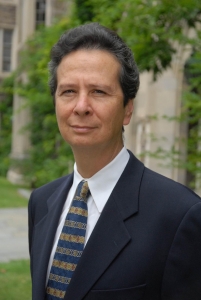
Bridges, Not Walls

At a time of strained relations between the United States and Mexico, a major conference at UC Santa Barbara Aug. 25 and 26 drew scholars from both nations to discuss the dynamics of immigration, trade and the future of the transnational relationship.
The conference, “Expanding Bridges and Overcoming Walls: A Transnational Interdisciplinary Conference,” sought to examine how U.S. and Mexican scholars and elected officials can collaborate on the most important issues affecting the two countries.
Among the participants were U.S. Congressman Salud Carbajal, who represents California’s 24th District, and California Attorney General Xavier Becerra as well as Alejandro Encinas Rodriguez, a senator representing the State of Mexico.
The proceedings were co-organized by Edward Telles, a distinguished professor of sociology at UCSB, and Raul Hinojosa, the founding director of UCLA’s North American Integration & Development Center (NAIDC).
Advancing Binational and Interdisciplinary Understanding
Telles called the conference a success, noting “we were able to bring together leading scholars from both sides of the border (in about equal numbers) to talk about immigration, trade and U.S.-Mexico relations. We advanced binational and interdisciplinary understanding of these subjects.”
According to Telles, the 2016 election was the catalyst for putting the conference together. “We saw the possibility of using our position as University of California professors to organize a cutting-edge conference along with a series of educational, research and service activities that would bring together the best research on these issues and quite frankly, to oppose the administration’s misinformed but ideologically laden opposition to immigration and international trade,” he said.
UCSB Chancellor Henry T. Yang opened the proceedings by commenting that this is “a difficult time in our two nations’ history,” and said the conference offered a way for American and Mexican scholars to collaborate on a range of issues and policies.
A Win-Win for Both Countries
Panels over the two days examined a wide range of topics. The first looked at comparative demography, focusing on Mexico-U.S. interdependence. Participants included Ana Gonzalez-Barrera, a senior researcher at Pew Research Center and an expert on Mexican immigration to the U.S.; Silvia Giorgiuli, president of El Colegio de México; and Dr. David Hayes-Bautista, a professor of medicine at UCLA and director of the Center for the Study of Latino Health and Culture at the UCLA School of Medicine.
“Our goal in this conference is to discuss the triad of immigration, free trade and U.S.-Mexico relations all together, particularly the advantages of free trade and immigration and how the Mexicans and U.S. governments can better take advantage of them,” Telles said in his opening address to the conference. “We believe this can be and has been a win-win for both countries.’
An Evidence-Based Counter-Narrative
A separate panel, moderated by conference co-convener Hinojosa, focused on the future of Mexico-U.S.-California relations. Among the discussants were U.S. Rep. Jimmy Gomez, whose California district spans central, east and northeast Los Angeles; and senators Encinas Rodriguez and Benjamín Robles, who represents Oaxaca, Mexico.
“We have assembled panels of distinguished scholars,” Telles said, “to understand the evidence or real — not alternative — facts about immigration, trade and U.S. Mexico relations and the interaction among them and share that knowledge through this conference and a future edited volume, potentially creating a counter-narrative based on real evidence to Trump’s divisive politics of fear and misinformation.”
The event, held at UCSB’s Corwin Pavilion, was presented by the campus’s Broom Center for Demography, UCLA’s NAIDC, Centro d Investigaciones y Estudios Superiores en Antropología Social (CIESAS) and El Colegio de México.



